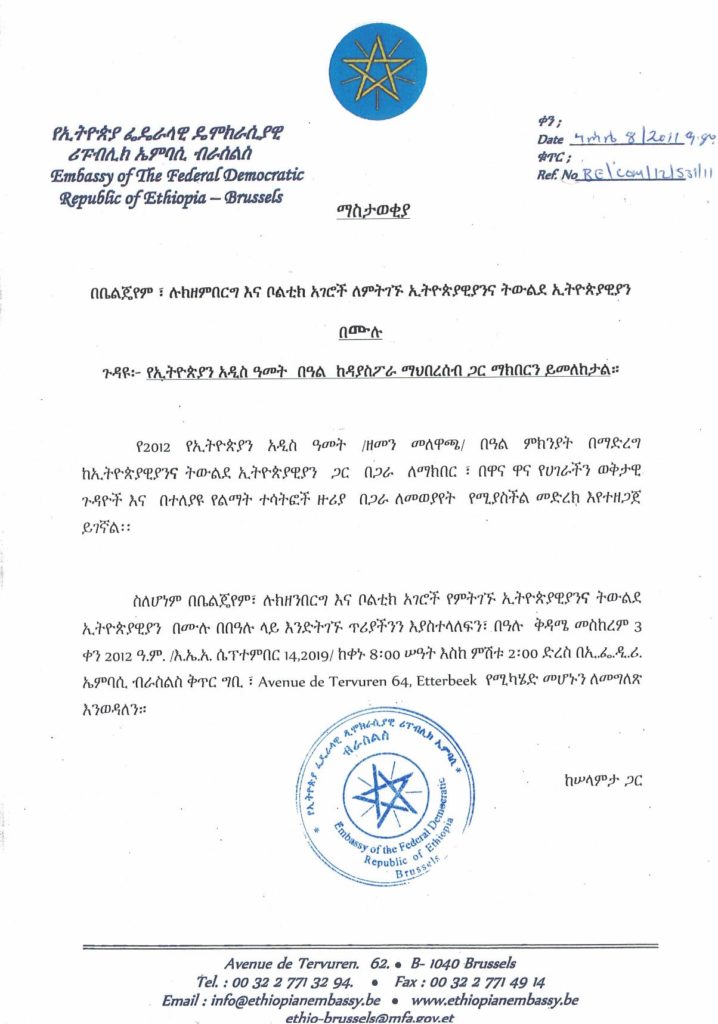

Announcement to the diaspora: Ethiopian New Year

embassy news


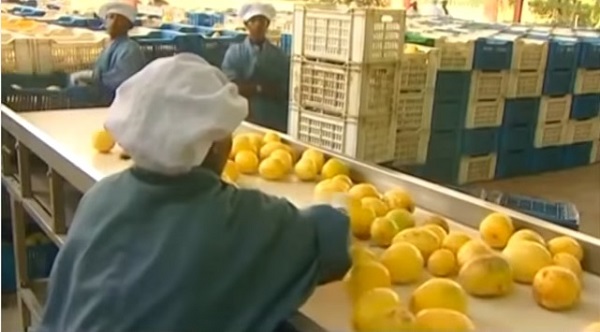

Ethiopia and China are set to partner to build a new, 300 million U.S. dollar industrial park in the East African country.
According to Liu Yu, economic and commercial counsellor at the Chinese Embassy in Ethiopia, the construction of the park, that will be located in Adama city, 99 km southeast of Addis Ababa, could start before the end of 2019.
85 percent of the funding needed to build the industrial park will be covered through Chinese government concessional loans while the remaining 15 percent will come from the Ethiopian government.
“The planned industrial park will focus on attracting firms engaged in equipment manufacturing,” Liu said, noting that work is being done to conclude land acquisition and financing-related procedures.
It will be the second industrial park in Adama city, a key commercial hub in central Ethiopia.
The first Adama industrial park, which was built by China Civil Engineering Construction Corporation (CCECC) at a cost of 146 million dollars, was inaugurated by Ethiopian Prime Minister Abiy Ahmed in October 2018.
Covering 100 hectares of land, the industrial park is expected to create job opportunities for around 25,000 Ethiopians and is part of Ethiopia’s grand plan to transform its largely agrarian economy into an industrialized one by 2025.
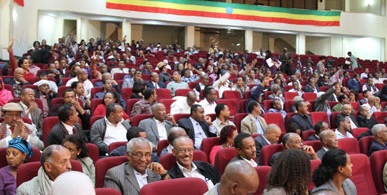
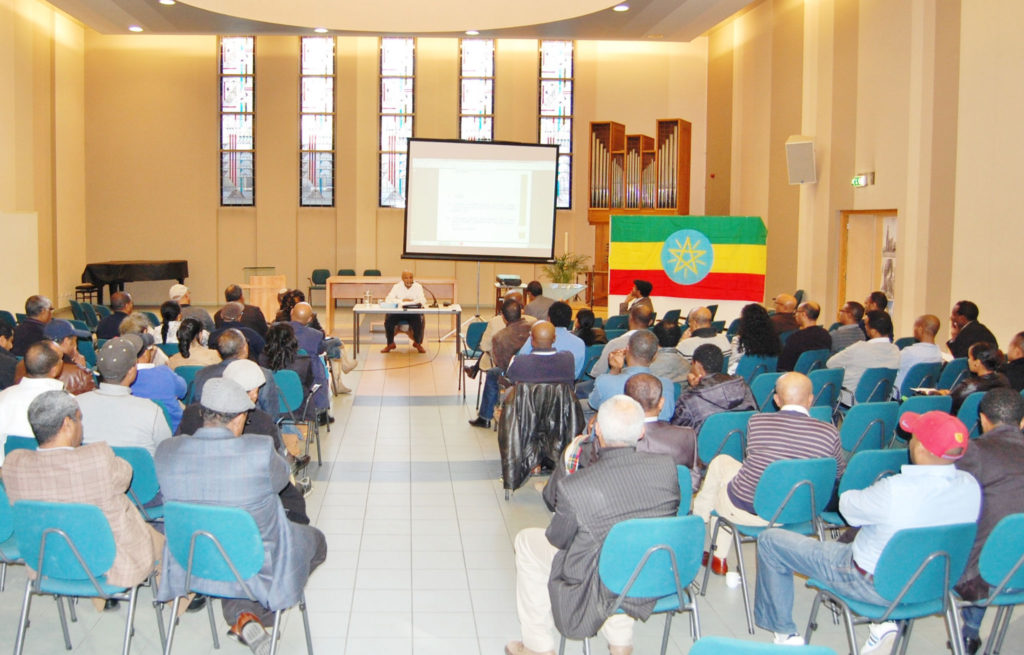
Ethiopia’s parliament has passed a bill to allow members of the Ethiopian diaspora, who have taken up nationalities in other countries, to invest, buy shares, and set up lending businesses in the country’s state-dominated financial sector.
It’s the latest step in a general push to liberalize the country’s economy. The government has previously said it will privatize Ethio Telecom, the state-owned telecommunication monopoly.
Since Ethiopia does not allow citizens to have dual nationalities, the latest round of reforms is seen as good news for the country’s 5 million-strong diaspora community as well as Ethiopians with foreign nationalities living inside the country.
The government has been eyeing overhauls to the financial sector, along with other sectors, since Abiy Ahmed’s appointment as prime minister. But authorities have previously called for preparation ahead of any full-scale effort that might create an influx of international banks, and hurt local lending practices.
Some see the opening up of the financial industry to the country’s diaspora community as a trial run for its eventual full liberalization, a move that excites Ethiopian investors abroad. “It will be great for both the country and diaspora community to be able to invest in the whole financial sector,” says Kassy Kebede, founder and managing director at Cepheus Growth Capital, a New York-based Ethiopia focused private equity fund.
Outside of the US, Mimi Alemayehou, a Dakar-based managing director of the investment platform, the Black Rhino Group, says she is keen to invest, and has spoken with other Ethiopians in the diaspora who are looking to do the same.
Targeting the diaspora for Ethiopia’s economic growth has been a recurring theme by the prime minister. Last year, Abiy set up a council for the Ethiopian Diaspora Trust Fund, a non-profit organization which raises money from the global diaspora community, and works alongside the government to build development projects in Ethiopia. The call was simple: donate $1 a day to restore your home country. Ethiopians in the diaspora listened, and so far, the organization has raised over $4 million for projects in financial inclusion, entrepreneurship development, and much more.
Birhanie Beka Geleto, a finance director at the DC-based consulting firm, Dewey Square Group says the opening is a good opportunity for the diaspora to bring “technology advancement in the industry with them.” Digital transformation is something the country has in mind, with Ethiopia’s parliament placing provisions in the recent overhaul to allow the private sector to operate digital-based financial services in the country.
Source: Quartz
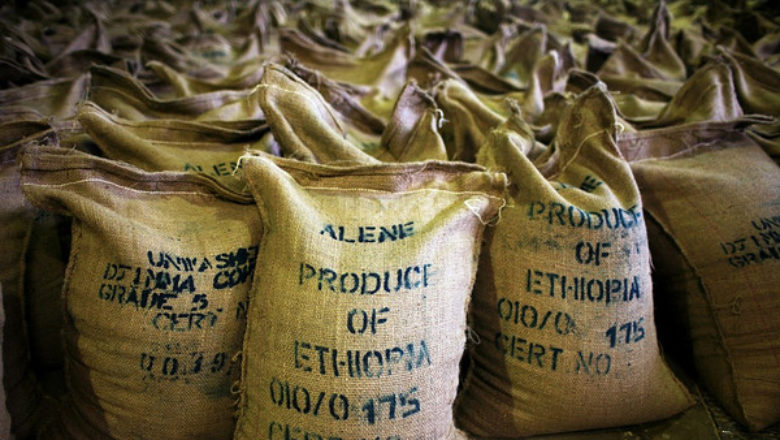

The Ethiopian government on Saturday said the country made more than 1.2 billion U.S. dollars in revenue from the exports of coffee and oilseeds during the just-concluded Ethiopian fiscal year that ended on July 7.
The revenue was generated from the export of coffee, mung beans, white kidney beans, sesame seeds and soya beans.
Large amount of the export revenue was generated from the export of coffee. Ethiopia is one of Africa’s largest producers of Arabica coffee, in which coffee production is dubbed as the backbone of the country’s agriculture-led economy.
Ethiopia also recently revealed a new initiative to uplift the current close to 600,000 tons of annual coffee production to 1.8 million tons within the coming five years period.
According to the Ethiopian Coffee and Tea Authority (ECTA), the Chinese market is expected to be a major destination for the nation’s coffee exports.
In April this year, China and Ethiopia signed a Memorandum of Understanding on coffee exports to China and to deepen bilateral trade cooperation.
Amid increasing demand for coffee among younger Chinese, penetrating the emerging coffee market is also increasingly seen as a major priority among Ethiopian coffee producers and exporters.
Ethiopia’s sesame production, which is also considered as one of Ethiopia’s top export commodities next to coffee, has in recent years witnessed growing interest from the Chinese market.
Haile Berhe, President of the Ethiopian Pulses, Oilseeds and Spices Processors-Exporters Association, told Xinhua recently that the export of sesame seed to China currently constitutes close to 70 percent of the country’s total export of the product to the global market.
China is already the east African country’s major export destination. Ethiopia, during the previous Ethiopian 2017-2018 fiscal year, had exported 245 million U.S. dollars of goods to China, according to the Ethiopian Ministry of Trade.


Ethiopia broke a world record by planting more than 353 million trees in 12 hours on Monday 20 July. The burst of tree planting was part of a wider reforestation campaign named “Green Legacy,” spearheaded by Prime Minister Abiy Ahmed. Millions of Ethiopians across the country were invited to take part in the challenge and within the first six hours, Ahmed tweeted that around 150 million trees had been planted.”We’re halfway to our goal,” he said and encouraged Ethiopians to “build on the momentum in the remaining hours.”
After the 12-hour period ended, the Prime Minister took to Twitter again to announce that Ethiopia not only met its “collective #GreenLegacy goal,” but exceeded it. A total of 353,633,660 tree seedlings had been planted, according to the country’s minister for innovation and technology, Getahun Mekuria.
Monday’s challenge had encouraged citizens in Africa’s second-most populous nation to plant 200 million trees in one day. In 2017, India set the world record when around 1.5 million volunteers planted 66 million in 12 hours. Ethiopia’s goal for the whole season is even bigger than that; the national tree planting campaign aims to plant 4 billion trees during “the rainy season” — between May and October.
According to Farm Africa, an organization working on reforestation efforts in East Africa and helping farmers out of poverty, less than 4% of Ethiopia’s land is forested, compared to around 30% at the end of the 19th century. The country is also suffering from the effects of the climate crisis, with land degradation, soil erosion, deforestation, and recurrent droughts and flooding.
In 2017, Ethiopia joined more than 20 other African nations in pledging to restore 100 million hectares of land as part of the African Forest Landscape Restoration Initiative. A recent study estimated that restoring the world’s lost forests could remove two-thirds of all the planet-warming carbon that is in the atmosphere because of human activity.


The Ministry of Agriculture disclosed on July 24 that the country has already planted 2.6 billion trees slated to meet the 4 billion trees planting national project.
The national 4 billion trees planting project officially launched by Prime Minister Abiy Ahmed on May 26, 2019, is set to mobilize national reforestation program of planting 40 tree seedlings per head.
Furthermore, he announced the planting of 200 million saplings on a single day on 29 July 2019, expecting to break the world record held by India.
In line with this, Agriculture Minister, Umar Hussen said that the distribution of seedlings for planting will be completed on Friday.
Nationwide monitoring of planted seedlings will be conducted to ensure that the planted trees would be grown, he said.
This will continue even in the future to identify which seedlings have grown and where and which ones have died out or have been nourished by those who planted them, he added.
The national initiative is critical for Ethiopia, as the country has lost billions of trees and forest resources over the years.
Most of the seedlings planted are from indigenous tree species.
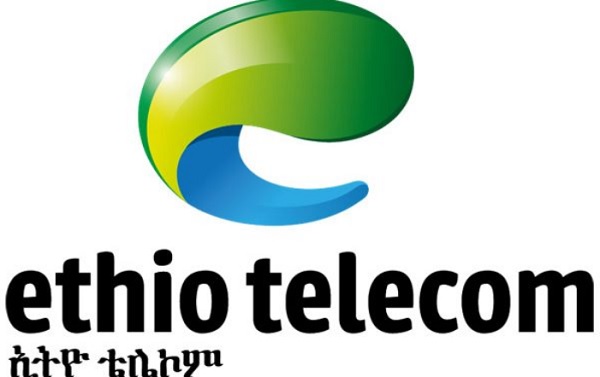

State-owned Ethio Telecom, a potential candidate for privatisation, generated 36.3 billion Ethiopian birr ($1.26 billion) in revenue during the last financial year, a company report said on July 23, a 7% rise on the previous year.
The total number of subscribers of the only telecom operator in the country has managed to increase the total number of subscribers to 43.63 million, which was 37.92 million the previous year, according to Firehiwot Tamiru, CEO of Ethio Telecom
Multinational firms are eyeing a slice of the telecom provider after Ethiopia’s parliament passed a law last month to liberalise the telecommunications sector.
France’s Orange, MTN of South Africa, Britain’s Vodafone Group, the UAE’s Etisalat and Zain of Kuwait are among the companies that have expressed an interest in the firm.


France’s Minister of Finance Bruno Le Maire arrived in Addis Ababa on Monday for a working visit to foster and diversify economic ties between the two countries.
In March 2019, French President Emmanuel Macron paid a visit to Ethiopia and signed several cooperation accords, including air cooperation and joint operations, and opportunities for training and equipment purchases.
Ethiopia and France also signed a military cooperation accord, a deal which includes helping Ethiopia build a navy.
Prime Minister Abiy Ahmed received Mr Le Maire at his office, where they discussed the ongoing strengthening of the economic cooperation between Ethiopia and France.
Mr Le Maire conveyed France’s appreciation of steps being taken by Ethiopia, particularly to increase competitiveness and business conduciveness. The French Minister further confirmed Ethiopia as an investment destination for France.
The same day, the French delegation visited the headquarters of Ethiopian airlines, where they met with CEO Tewolde GebreMariam and the Executive Management team to discuss the areas of partnerships and cooperation between the airline and French companies.
Commenting on the areas of the discussion, H.E. Bruno Le Maire said: “The recent launch of a flight to Marseille by Ethiopian Airlines is indicative of the growing partnership between Ethiopia and France. There is a huge potential for further partnership in aviation-related areas.”
Ethiopia and France have agreed to advance their cooperation in energy, logistics and telecommunications sectors. Some 40 million Euros support will also be provided soon for Ethiopia’s digital ID project.
French Economic and Finance Minister Bruno Le Maire said: “President Macron last March decided with PM Abiy Ahmed to reinforce the economic relationship between our two countries, and I really want this enforcement to be as concrete and as successful as possible.”
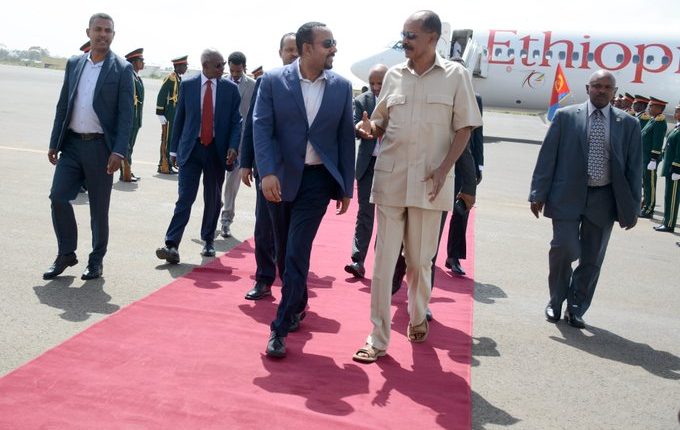

Prime Minister Abiy Ahmed, arrived in Asmara on July 18 for a two-day working visit.
Eritrea’s President Isaias Afwerki gave a warm welcome to the Prime Minister and his delegation on their arrival at Asmara’s International Airport.
The objective of the visit is to further enhancement of the all-rounded cooperation between the two countries as well as regional and other matters of mutual interest.
Prime Minister Abiy and President Isaias Afwerki held talks at State House on the same day.
The discussion focused on further deepening the ongoing vibrant peace process and all-rounded cooperation between the two countries on the basis of the five-point Joint Declaration of Peace and Friendship signed on 9 July 2018.
The two leaders further agreed to broaden the positive ramifications of the peace process and robust cooperation underway to the Horn.
Accompanied by President Isaias, Prime Minister Dr Abiy and his entourage visited several development projects and construction work on the Nefasit-Decamhare highway.
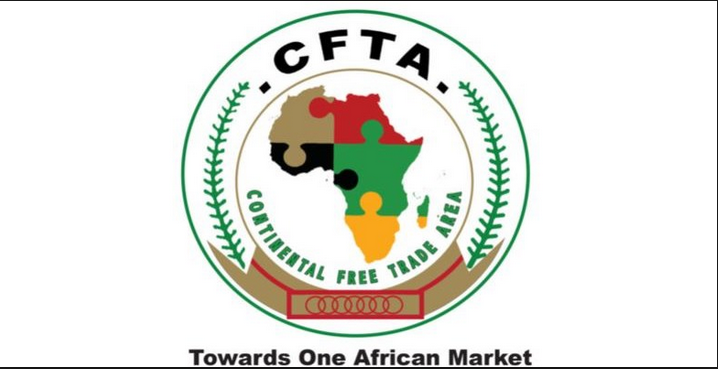

Ethiopia has agreed to liberalize 90 percent of its tariff for members the of African Continental Free Trade Agreement (AfCFTA), the Ministry of Foreign Affairs announced.
Hirut Zemene, Ethiopian State Minister of Foreign Affairs, said Ethiopia, within the coming 15 years, will scale back 90 percent of tariffs for members of AfCFTA. The State Minister further noted Ethiopia made the decision after negotiations that lasted two years.
Ms Hirut added that existing conditions are well considered in the tariff liberalization, and Ethiopia’s national economic advantage remains maintained.
Woinshet Tadesse (Ambassador), Ethiopia’s Permanent Representative to the African Union, remarked that being part of AfCFTA will help Ethiopia develop industries that could create more jobs for the unemployed while stabilizing the market for consumers. She also noted that the move helps create strong industries in Africa, which might even the continent’s competitive edge in the international market. AfCFTA will create economic integration and social solidarity among member states, she pointed out.
The tariff liberalization for AfCFTA member states will commence from July 1, 2020, onwards, it was learned, and it will be based on law and regulation.